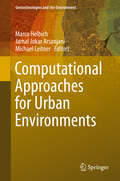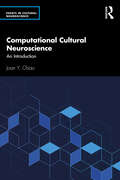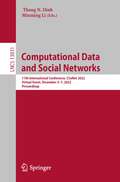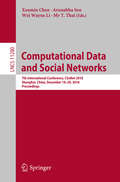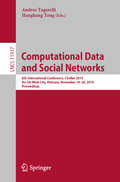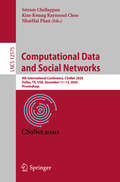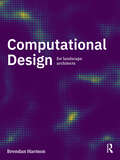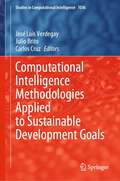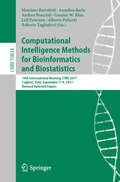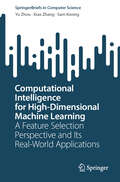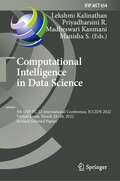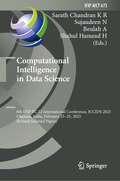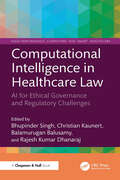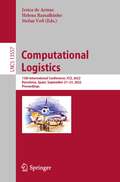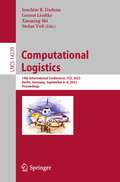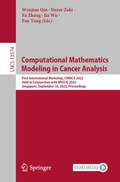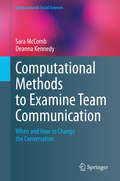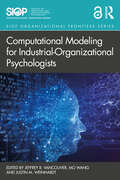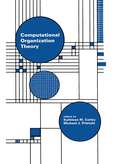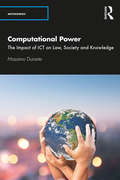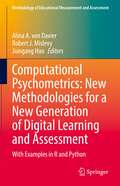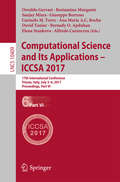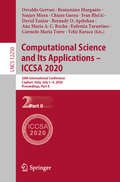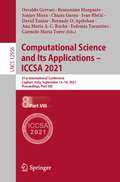- Table View
- List View
Computational Approaches for Urban Environments (Geotechnologies and the Environment #13)
by Michael Leitner Jamal Jokar Arsanjani Marco HelbichThis book aims to promote the synergistic usage of advanced computational methodologies in close relationship to geospatial information across cities of different scales. A rich collection of chapters subsumes current research frontiers originating from disciplines such as geography, urban planning, computer science, statistics, geographic information science and remote sensing. The topics covered in the book are of interest to researchers, postgraduates, practitioners and professionals. The editors hope that the scientific outcome of this book will stimulate future urban-related international and interdisciplinary research, bringing us closer to the vision of a "new science of cities. "
Computational Cultural Neuroscience: An Introduction (Essays in Cultural Neuroscience)
by Joan Y. ChiaoThis book provides novel insights into the study of empirical computational approaches in the field of cultural neuroscience. It discusses and analyses topics such as cultural intelligence, cultural machine learning, cultural brain dynamics and cultural security. This comprehensive text engages with computational principles to guide the research on the influence of cultural environments on human genetics. It explores the theoretical and methodological approaches involved in computational neuroscience. The author elucidates how cultural processes intersect with the structural organization of the nervous system, contributing to the study of computational principles and neural information-processing mechanisms at the cultural level. Research in this subject area can help provide better understanding of the role of computation in cultural neuroscience, stimulating further research into practice and policy.Computational Cultural Neuroscience: An Introduction is the ideal resource for academics, researchers and students of psychology, neuroscience, computer science or philosophy, who are interested in cultural neuroscience.
Computational Data and Social Networks: 11th International Conference, CSoNet 2022, Virtual Event, December 5–7, 2022, Proceedings (Lecture Notes in Computer Science #13831)
by Thang N. Dinh Minming LiThis book constitutes the refereed proceedings of the 11th International Conference on Computational Data and Social Networks, CSoNet 2022, held as a Virtual Event, during December 5–7, 2022. The 17 full papers and 7 short papers included in this book were carefully reviewed and selected from 47 submissions. They were organized in topical sections as follows: Machine Learning and Prediction, Security and Blockchain, Fact-checking, Fake News, and Hate Speech, Network Analysis, Optimization.
Computational Data and Social Networks: 7th International Conference, CSoNet 2018, Shanghai, China, December 18–20, 2018, Proceedings (Lecture Notes in Computer Science #11280)
by My T. Thai Xuemin Chen Arunabha Sen Wei Wayne LiThis book constitutes the refereed proceedings of the 7th International Conference on Computational Data and Social Networks, CSoNet 2018, held in Shanghai, China, in December 2018.The 44 revised full papers presented in this book toghether with 2 extended abstracts, were carefully reviewed and selected from 106 submissions. The topics cover the fundamental background, theoretical technology development, and real-world applications associated with complex and data network analysis, minimizing in uence of rumors on social networks, blockchain Markov modelling, fraud detection, data mining, internet of things (IoT), internet of vehicles (IoV), and others.
Computational Data and Social Networks: 8th International Conference, CSoNet 2019, Ho Chi Minh City, Vietnam, November 18–20, 2019, Proceedings (Lecture Notes in Computer Science #11917)
by Hanghang Tong Andrea TagarelliThis book constitutes the refereed proceedings of the 8th International Conference on Computational Data and Social Networks, CSoNet 2019, held in Ho Chi Minh City, Vietnam, in November 2019. The 22 full and 8 short papers presented in this book were carefully reviewed and selected from 120 submissions. The papers appear under the following topical headings: Combinatorial Optimization and Learning; Influence Modeling, Propagation, and Maximization; NLP and Affective Computing; Computational Methods for Social Good; and User Profiling and Behavior Modeling.
Computational Data and Social Networks: 9th International Conference, CSoNet 2020, Dallas, TX, USA, December 11–13, 2020, Proceedings (Lecture Notes in Computer Science #12575)
by Kim-Kwang Raymond Choo Sriram Chellappan NhatHai PhanThis book constitutes the refereed proceedings of the 9th International Conference on Computational Data and Social Networks, CSoNet 2020, held in Dallas, TX, USA, in December 2020. The 20 full papers were carefully reviewed and selected from 83 submissions. Additionally the book includes 22 special track papers and 3 extended abstracts. The selected papers are devoted to topics such as Combinatorial Optimization and Learning; Computational Methods for Social Good Applications; NLP and Affective Computing; Privacy and Security; Blockchain; Fact-Checking, Fake News and Malware Detection in Online Social Networks; and Information Spread in Social and Data Networks.
Computational Design for Landscape Architects
by Brendan HarmonThis book is a guide to computational design for landscape architects replete with extensive tutorials. It introduces algorithmic approaches for modeling and designing landscapes. The aim of this book is to use algorithms to understand and design landscape as a generative system, i.e. to harness the processes that shape landscape to generate new forms. An algorithmic approach to design is gently introduced through visual programming with Grasshopper, before more advanced methods are taught in Python, a high-level programming language. Topics covered include parametric design, randomness and noise, waves and attractors, lidar, drone photogrammetry, point cloud modeling, terrain modeling, earthworks, digital fabrication, and more. The chapters include sections on theory, methods, and either visual programming or scripting. Online resources for the book include code and datasets so that readers can easily follow along and try out the methods presented. This book is a much-needed guide, both theoretical and practical, on computational design for students, educators, and practitioners of landscape architecture.
Computational Intelligence Methodologies Applied to Sustainable Development Goals (Studies in Computational Intelligence #1036)
by José Luis Verdegay Julio Brito Carlos CruzThis book presents computational intelligence methodologies and its applications to sustainable development goals. Along 18 chapters prepared by reputed scientists around the world, this book explores and focuses on the impacts produced by the application of artificial intelligence and mainly of computational intelligence, in sustainable development goals and on analysing how particularly computational intelligence can influence the ability to comply in a timely manner with all the sustainable development goals. Specialists from STEM areas will find in this book an attractive showcase of instances and research lines to be explored.
Computational Intelligence Methods for Bioinformatics and Biostatistics: 14th International Meeting, CIBB 2017, Cagliari, Italy, September 7-9, 2017, Revised Selected Papers (Lecture Notes in Computer Science #10834)
by Leif Peterson Roberto Tagliaferri Alberto Policriti Andrea Bracciali Massimo Bartoletti Annalisa Barla Gunnar W. KlauThis book constitutes the thoroughly refereed post-conference proceedings of the 14th International Meeting on Computational. Intelligence Methods for Bioinformatics and Biostatistics, CIBB 2017, held in Cagliari, Italy, in September 2017.The 19 revised full papers presented were carefully reviewed and selected from 44 submissions. The papers deal with the application of computational intelligence to open problems in bioinformatics, biostatistics, systems and synthetic biology, medical informatics, computational approaches to life sciences in general.
Computational Intelligence for High-Dimensional Machine Learning: A Feature Selection Perspective and Its Real-World Applications (SpringerBriefs in Computer Science)
by Yu Zhou Xiao Zhang Sam KwongThis book focuses on the modelling and optimization aspects of the feature selection problem through computational intelligence methods in complex, high-dimensional supervised machine learning. To aid readers in conducting research in this field, it covers fundamental concepts and state-of-the-art algorithms. This book also provides a detailed insight into applying these algorithms into real-world applications. The authors begin by introducing the definition high-dimensional machine learning (ML) problems and the challenges they pose. Subsequently, they delve into dimension reduction methods for high-dimensional ML, including global and local feature selection (FS) techniques. This book also comprehensively presents computational intelligence methods such as evolutionary computation and deep neural networks for FS, supported by both theoretical and empirical evidence. Furthermore, this book explores real-world scenario applications involving high-dimensional ML, particularly in the context of smart cities, bioinformatics and industrial informatics. This book is a suitable read for postgraduates and researchers who are interested in the research areas of computational intelligence, soft computing, machine learning and deep learning. Professionals and practitioners within these related fields will also benefit from this book.
Computational Intelligence in Data Science: 5th IFIP TC 12 International Conference, ICCIDS 2022, Virtual Event, March 24–26, 2022, Revised Selected Papers (IFIP Advances in Information and Communication Technology #654)
by Lekshmi Kalinathan Priyadharsini R. Madheswari Kanmani Manisha S.This book constitutes the refereed post-conference proceedings of the Fifth IFIP TC 12 International Conference on Computational Intelligence in Data Science, ICCIDS 2022, held virtually, in March 2022. The 28 revised full papers presented were carefully reviewed and selected from 96 submissions. The papers cover topics such as computational intelligence for text analysis; computational intelligence for image and video analysis; blockchain and data science.
Computational Intelligence in Data Science: 6th IFIP TC 12 International Conference, ICCIDS 2023, Chennai, India, February 23–25, 2023, Revised Selected Papers (IFIP Advances in Information and Communication Technology #673)
by Sarath Chandran K R Sujaudeen N Beulah A Shahul Hamead HThis book constitutes the proceedings of the 6th IFIP TC 12 International Conference on Computational Intelligence in Data Science, ICCIDS 2023, which took place in Kalavakkam, India, in February 2023.The 24 full papers presented in this volume were carefully reviewed and selected from 134 submissions. The major theme of the conference was intended to be computation intelligence and knowledge management. Various emerging areas like IoT, cyber security and data science need computation intelligence to align with the cutting-edge research. Machine learning delivers insights hidden in data for rapid, automated responses and improved decision making. Machine learning for IoT can be used to project future trends, detect anomalies, and augment intelligence by ingesting image, video, and audio.
Computational Intelligence in Healthcare Law: AI for Ethical Governance and Regulatory Challenges (High-Performance Computing for Smart Healthcare)
by Christian Kaunert Bhupinder Singh Balamurugan Balusamy Rajesh Kumar DhanarajThis book explores the intersection of legal frameworks, healthcare innovation, and computational intelligence, shedding light on how emerging technologies like artificial intelligence (AI) and machine learning (ML) are reshaping the medical landscape. It presents real- life challenges such as patient privacy, data security, and compliance issues in smart healthcare by delving into the associated ethical and regulatory implications. Comprising the concepts of predictive analytics, regulatory compliance algorithms, and legal decision- making processes, this book offers a roadmap for stakeholders to navigate the evolving landscape of healthcare innovation responsibly and ethically.Features: Investigates how artificial intelligence supports legal decision- making processes in smart healthcare, addressing ethical and accountability concerns Demonstrates the use of smart contracts and automation tools powered by computational intelligence to streamline legal processes and ensure compliance in smart healthcare initiatives Focuses on managing healthcare data within legal frameworks, emphasizing the role of computational intelligence’s in ensuring privacy and security Examines how computational intelligence enables predictive analytics models to anticipate legal challenges and compliance issues in smart healthcare Highlights the development and implementation of computational algorithms for navigating evolving legal frameworks in healthcare This reference book is a useful resource for scholars and researchers working on smart healthcare.
Computational Logistics: 13th International Conference, ICCL 2022, Barcelona, Spain, September 21–23, 2022, Proceedings (Lecture Notes in Computer Science #13557)
by Stefan Voß Jesica De Armas Helena RamalhinhoThis book constitutes the refereed proceedings of the 13th International Conference on Computational Logistics, ICCL 2022, held in Barcelona, Spain, in September 2022.The 31 papers presented in this volume were carefully reviewed and selected from 64 submissions. They were organized in topical sections as follows: Maritime and Port Logistics; Vehicle Routing and Urban Logistics; Warehousing and Location; Supply Chain and Production Management.
Computational Logistics: 14th International Conference, ICCL 2023, Berlin, Germany, September 6–8, 2023, Proceedings (Lecture Notes in Computer Science #14239)
by Stefan Voß Joachim R. Daduna Xiaoning Shi Gernot LiedtkeThis book constitutes the refereed proceedings of the 13th International Conference on Computational Logistics, ICCL 2023, held in Berlin, Germany, during September 6-8, 2023. The 32 full papers presented in this volume were carefully reviewed and selected from 71 submissions. They are grouped into the following topics: computational logistics; maritime shipping; vehicle routing; traffic and transport; and combinatorial optimization.
Computational Mathematics Modeling in Cancer Analysis: First International Workshop, CMMCA 2022, Held in Conjunction with MICCAI 2022, Singapore, September 18, 2022, Proceedings (Lecture Notes in Computer Science #13574)
by Fan Yang Fa Zhang Jia Wu Nazar Zaki Wenjian QinThis book constitutes the proceedings of the First Workshop on Computational Mathematics Modeling in Cancer Analysis (CMMCA2022), held in conjunction with MICCAI 2022, in Singapore in September 2022. Due to the COVID-19 pandemic restrictions, the CMMCA2022 was held virtually. DALI 2022 accepted 15 papers from the 16 submissions that were reviewed. A major focus of CMMCA2022 is to identify new cutting-edge techniques and their applications in cancer data analysis in response to trends and challenges in theoretical, computational and applied aspects of mathematics in cancer data analysis.
Computational Methods to Examine Team Communication: When and How to Change the Conversation (Computational Social Sciences)
by Sara McComb Deanna KennedyThe primary focus of this book is an examination of longitudinal team communication and its impact on team performance. This theoretically-grounded, holistic examination of team communication includes cross-condition comparisons of team (i.e., distributed/in person, unrestricted/time pressured, two performance episodes) and employs multiple quantitative methodological approaches to examine the phenomena of interest. This book simultaneously provides practical content for researchers and practitioners in the social sciences and humanities. Included are step-by-step instructions for the methodologies employed, and distillations of findings via Managerial Minutes that highlight best practices and/or examples to help enhance team communication in practice.
Computational Modeling for Industrial-Organizational Psychologists (SIOP Organizational Frontiers Series)
by Mo Wang Jeffrey B. Vancouver Justin M. WeinhardtThis collection provides a primer to the process and promise of computational modeling for industrial-organizational psychologists. With contributions by global experts in the field, the book is designed to expand readers’ appreciation for computational modeling via chapters focused on key modeling achievements in domains relevant to industrial-organizational psychology, including decision making in organizations, diversity and inclusion, learning and training, leadership, and teams. To move the use of computational modeling forward, the book includes specific how-to-chapters on two of the most commonly used modeling approaches: agent-based modeling and system dynamics modeling. It also gives guidance on how to evaluate these models qualitatively and quantitatively, and offers advice on how to read, review, and publish papers with computational models. The authors provide an extensive description of the myriad of values computational modeling can bring to the field, highlighting how they offer a more transparent, precise way to represent theories and can be simulated to offer a test of the internal consistency of a theory and allow for predictions. This is accompanied by an overview of the history of computational modeling as it relates to I-O psychology. Throughout, the authors reflect on computational modeling’s journey, looking back to its history as they imagine its future in I-O psychology. Each contribution demonstrates the value and opportunities computational modeling can provide the individual researcher, research teams, and fields of I-O psychology and management. This volume is an ideal resource for anyone interested in computational modeling, from scholarly consumers to computational model creators.
Computational Modeling for Industrial-Organizational Psychologists (SIOP Organizational Frontiers Series)
by Mo Wang Jeffrey B. Vancouver Justin M. WeinhardtThis collection provides a straightforward primer to the process and promise of computational modeling for industrial-organizational psychologists. Computational models offer I-O psychologists a more transparent, precise way to represent theories, and may be simulated, which provides a test of the internal consistency of a theory and allows for predictions. A timely volume as enthusiasm for computational modeling is growing and this volume provides a set of examples and chapters devoted to the steps in producing and testing models. Chapters are designed for a range of readership levels, and also address modeling for novices, fitting models to data, how to validate models using experiments, and how computational modeling may facilitate integration across disciplines.
Computational Organization Theory
by Kathleen M. Carley Michael J. PrietulaThis volume represents an advance in our understanding of how to represent and reason about organizational phenomena. Although organizational theorists have long grappled with the complexities of adaptive agents, ecological systems, and non-linear relations among the basic elements of organizational design, they have not, until recently, had the tools to grapple with these complex relationships. Recent advances in logic, symbolic programming, network analysis, and computer technology have made possible a series of tools that can be used to understand the complexities of organizational behavior. New computational techniques make it possible to develop and test more realistic models of organizational behavior. This volume offers examples of this new breed of models, and provides insight into how these advances and techniques can be used to extend our theoretical understanding of organizations. Authored by leading researchers in the area of computational organization theory, the various chapters demonstrate the value of computational analysis for organizational theory and advance our understanding of the relationship between organizational design and performance. This book contains both theoretical and methodological contributions that enable organizational theorists to use computational and mathematical techniques to systematically address the complex relationships that underlie organizational life. It also presents new -- or sometimes, renewed -- approaches on how to conduct organizational research from multiple formal perspectives including: simulation, numerical analysis, symbolic logic, mathematical modeling, and graph theory.
Computational Power: The Impact of ICT on Law, Society and Knowledge (Antinomies)
by Massimo DuranteWe delegate more and more decisions and tasks to artificial agents, machine-learning mechanisms, and algorithmic procedures or, in other words, to computational systems. Not that we are driven by powerful ambitions of colonizing the Moon, replacing humans with legions of androids, creating sci-fi scenarios à la Matrix or masterminding some sort of Person of Interest-like Machine. No, the current digital revolution based on computational power is chiefly an everyday revolution. It is therefore that much more profound, unnoticed and widespread, for it affects our customary habits and routines and alters the very texture of our day-to-day lives. This opens a precise line of inquiry, which constitutes the basic thesis of the present text: our computational power is exercised by trying to adapt not just the world but also our representation of reality to how computationally based ICTs work. The impact of this technology is such that it does not leave things as they are: it changes the nature of agents, habits, objects and institutions and hence it subverts the existing order, without necessarily generating a new one. I argue that this power is often not distributed in an egalitarian manner but, on the contrary, is likely to result in concentrations of wealth, in dominant positions or in unjust competitive advantages. This opens up a struggle, with respect to which the task of reaffirming the fundamental values, the guiding principles, the priorities and the rules of the game, which can transform, or attempt to transform, a fierce confrontation between enemies in a fair competition between opponents rests on us.
Computational Psychometrics: With Examples in R and Python (Methodology of Educational Measurement and Assessment)
by Robert J. Mislevy Alina A. von Davier Jiangang HaoThis book defines and describes a new discipline, named “computational psychometrics,” from the perspective of new methodologies for handling complex data from digital learning and assessment. The editors and the contributing authors discuss how new technology drastically increases the possibilities for the design and administration of learning and assessment systems, and how doing so significantly increases the variety, velocity, and volume of the resulting data. Then they introduce methods and strategies to address the new challenges, ranging from evidence identification and data modeling to the assessment and prediction of learners’ performance in complex settings, as in collaborative tasks, game/simulation-based tasks, and multimodal learning and assessment tasks.Computational psychometrics has thus been defined as a blend of theory-based psychometrics and data-driven approaches from machine learning, artificial intelligence, and data science. All these together provide a better methodological framework for analysing complex data from digital learning and assessments. The term “computational” has been widely adopted by many other areas, as with computational statistics, computational linguistics, and computational economics. In those contexts, “computational” has a meaning similar to the one proposed in this book: a data-driven and algorithm-focused perspective on foundations and theoretical approaches established previously, now extended and, when necessary, reconceived. This interdisciplinarity is already a proven success in many disciplines, from personalized medicine that uses computational statistics to personalized learning that uses, well, computational psychometrics. We expect that this volume will be of interest not just within but beyond the psychometric community.In this volume, experts in psychometrics, machine learning, artificial intelligence, data science and natural language processing illustrate their work, showing how the interdisciplinary expertise of each researcher blends into a coherent methodological framework to deal with complex data from complex virtual interfaces. In the chapters focusing on methodologies, the authors use real data examples to demonstrate how to implement the new methods in practice. The corresponding programming codes in R and Python have been included as snippets in the book and are also available in fuller form in the GitHub code repository that accompanies the book.
Computational Science and Its Applications – ICCSA 2017: 17th International Conference, Trieste, Italy, July 3-6, 2017, Proceedings, Part VI (Lecture Notes in Computer Science #10409)
by Osvaldo Gervasi, Beniamino Murgante, Sanjay Misra, Giuseppe Borruso, Carmelo M. Torre, Ana Maria A.C. Rocha, David Taniar, Bernady O. Apduhan, Elena Stankova and Alfredo CuzzocreaThe six-volume set LNCS 10404-10409 constitutes the refereed proceedings of the 17th International Conference on Computational Science and Its Applications, ICCSA 2017, held in Trieste, Italy, in July 2017. The 313 full papers and 12 short papers included in the 6-volume proceedings set were carefully reviewed and selected from 1052 submissions. Apart from the general tracks, ICCSA 2017 included 43 international workshops in various areas of computational sciences, ranging from computational science technologies to specific areas of computational sciences, such as computer graphics and virtual reality. Furthermore, this year ICCSA 2017 hosted the XIV International Workshop On Quantum Reactive Scattering. The program also featured 3 keynote speeches and 4 tutorials.
Computational Science and Its Applications – ICCSA 2020: 20th International Conference, Cagliari, Italy, July 1–4, 2020, Proceedings, Part II (Lecture Notes in Computer Science #12250)
by Osvaldo Gervasi Beniamino Murgante Sanjay Misra Ana Maria A. C. Rocha David Taniar Bernady O. Apduhan Eufemia Tarantino Chiara Garau Ivan Blečić Carmelo Maria Torre Yeliz KaracaThe seven volumes LNCS 12249-12255 constitute the refereed proceedings of the 20th International Conference on Computational Science and Its Applications, ICCSA 2020, held in Cagliari, Italy, in July 2020. Due to COVID-19 pandemic the conference was organized in an online event.Computational Science is the main pillar of most of the present research, industrial and commercial applications, and plays a unique role in exploiting ICT innovative technologies.The 466 full papers and 32 short papers presented were carefully reviewed and selected from 1450 submissions. Apart from the general track, ICCSA 2020 also include 52 workshops, in various areas of computational sciences, ranging from computational science technologies, to specific areas of computational sciences, such as software engineering, security, machine learning and artificial intelligence, blockchain technologies, and of applications in many fields.
Computational Science and Its Applications – ICCSA 2021: 21st International Conference, Cagliari, Italy, September 13–16, 2021, Proceedings, Part VIII (Lecture Notes in Computer Science #12956)
by Osvaldo Gervasi Beniamino Murgante Sanjay Misra Ana Maria A. C. Rocha David Taniar Bernady O. Apduhan Eufemia Tarantino Chiara Garau Ivan Blečić Carmelo Maria TorreThe ten-volume set LNCS 12949 – 12958 constitutes the proceedings of the 21st International Conference on Computational Science and Its Applications, ICCSA 2021, which was held in Cagliari, Italy, during September 13 – 16, 2021. The event was organized in a hybrid mode due to the Covid-19 pandemic.The 466 full and 18 short papers presented in these proceedings were carefully reviewed and selected from 1588 submissions. Part VIII of the set includes the proceedings of the following workshops: International Workshop on Privacy in the Cloud/Edge/IoT World (PCEIoT 2021); International Workshop on Processes, methods and tools towards RE-Silient cities and cultural heritage prone to SOD and ROD disasters (RES 2021); International Workshop on Risk, resilience and sustainability in the efficient management of water resources: approaches, tools, methodologies and multidisciplinary integrated applications (RRS 2021); International Workshop on Scientific Computing Infrastructure (SCI 2021); International Workshop on Smart Cities and User Data Management (SCIDAM 2021).
